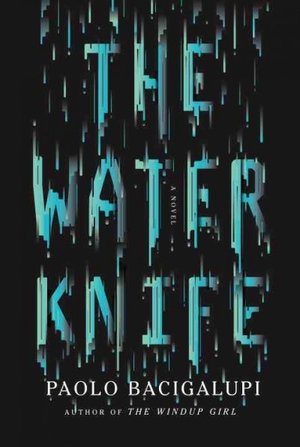
The Water Knife by Paolo Bacigalupi – Available Here
I like Paolo Bacigalupi. I like his dogged pursuit of environmentalist sci-fi dystopia. It’s a rare genre and one that it would be all too easy to get drenched in the Holier-Than-Thou attitude that comes with any deeply held conviction especially with one as prescient and politically tumultuous as climate change in America.
I read Bacigalupi’s first novel, The Wind-up Girl just after everyone else had read, gushed, and cast awards in front of it like Jesus and his donkey on their way to Jerusalem (in this instance I suppose that would make Bacigalupi the donkey, but if that’s not the truest description of a novelist to their novel I don’t know what is). I loved the vibrancy of setting, the inventiveness of a city constantly on the precipice of disaster on so many fronts. I didn’t love the myriad of different plot threads that came together with a limp-wristed apathy so muddled the book could never really be elevated to the status as ‘great’.
It was a first novel, and while I’m certain mine will accomplish far less the book was undoubtedly a little wet behind the ears. Its style was too pop-lit, short flavorless sentences that conveyed information in as direct and sterile a way as possible, with very little of that literary flair that such wonderful and unique vision deserve (perhaps this was part of the books larger audience appeal, I don’t know). Regardless, I liked Bacigalupi and looked forward to a sequel.
But I never got one. I searched, certain that there was so much more to be done, expansions and retractions to be toyed with, more robots, more, more, MORE! Instead, I followed him in interviews where he stated that there would, at least not for a long time, not be a sequel. The Wind-up Girl it turns out, in its sexual violence, and general dystopic depravity had taken a toll on him. He then went on to publish three or four consecutive young adult novels. The first I can empathize with, the second I cannot. Still, I read the first of his YA books. “Well, good YA book exists,” I told myself, “Sure, I can count them on two hands, but they are out there so maybe he…”
So, six years later and we finally get a new adult novel from him in the form of The Water Knife, a sophomore ‘adult’ effort that carries the same environmentalist concerns of all his previous books, but with the honed and focused plotting of a thriller. It feels like he has learned how to be concise in the tautness of his YA prose, and then allowed himself some room to play with his language and imagery. The characters are stronger, better back-boned, infinitely well suited for the nouveau détruit world where water rights to languishing aquifers are worth their tonnage in blood, petrol, and ballistic missiles. Say what you will of this idea’s realism, but it’s certainly evocative and I’m not sure about you, but I’m not one to look a gift AH-64 Apache in the mouth.
And that really is the beauty of The Water Knife compared to his first book: there is a balance and a rather severe sense of purpose behind the world building. Now, whether that is because it’s been six years and nothing has been done rightly, big or small regarding climate change, but the most horrifying parts of The Water Knife come from necessity of plot and not some youthful desire to shock (Looking at you robot champagne-vagina scene). It’s gritty, dark, and merciless, because that is what lingers underneath all of niceties of the bureaucratic water contracts everyone holds high and whole above all others. It is only through contentment that litigation is anything but a withered version of an old Icleandic braining. This book is that desperate space as the former tries to stave off the ease and entices of the other. And it works well for it.
On a final note, in Bacigalupi’s first book I noticed a lot of ‘preferred’ word, ones he would use an almost irresponsible number of times. It bothered the hell of me at the time because I took it to be lazy because he didn’t want to find another word for ‘acquiesce’, but the same thing happened here in The Water Knife. It is now clear that it’s not laziness, but his sense of style. I really wish it didn’t grate as hard as it does. Maybe it’s the words chosen, the evocativeness of them as opposed to the classical poetics chosen by Homer and indeed Tolstoy in Anna Karenina.
“The world is big, but we broke it.” – Paolo Bacigalupi, The Water Knife
